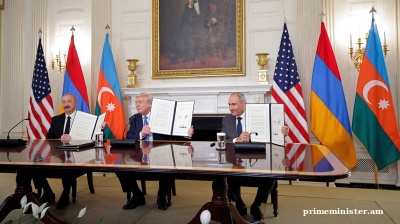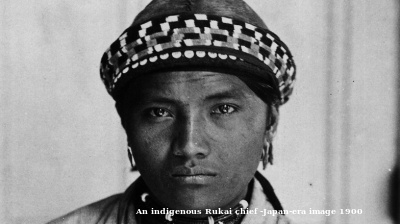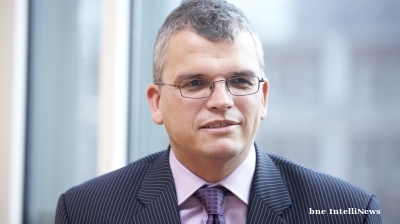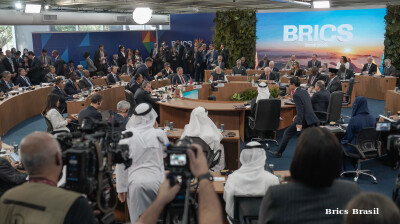The vision for me of the weekend opening of the World Cup in Qatar was of Turkish President Recep Tayyip Erdogan warmly welcoming his Egyptian counterpart, Fatah el-Sisi. The two have long been each other's nemesis – Sisi violently removing Erdogan’s fellow Islamists, the Muslim Brotherhood, from office in Egypt and with Sisi viewing Erdogan’s version of political Islam as a threat to his own vision of managed democracy at home.
Since Sisi moved against the Muslim Brotherhood in Egypt, Turkey has been home to its exiles and the Turkish state-run media have long been critical of the Sisi regime.
The two appeared to have very different visions for the future of democracy in the region and were part of different regional political camps or alliances: Turkey aligned with the more politically liberal Qatar; Egypt with the likes of more politically restrictive absolute monarchies in Saudi Arabia and the UAE, who essentially wrote the cheques to maintain the Sisi regime in office.
But something seems to have changed in the past year or so, and Erdogan’s meeting with Sisi appears to be reflective of that.
The change in the willingness to engage seems to have come more from Ankara than Cairo. Erdogan is facing difficult elections over the next year, and faces a challenging economic mix – therein a fraught balance of payments position. Erdogan needs dollars to try to cover huge holes in the country’s balance of payments – the gross external financing need is likely close to $250bn this year, with gross FX reserves of just over $110bn insufficient to meet this shortfall. If he cannot fill the void, the lira will melt even more from its already massively depreciated level and inflation will rise even further from the inflated 85% plus level for October. Surely the combination of an FX sell-off and even higher prices would lose him elections which have to be held by June 2023.
Erdogan’s choices? Well he could go back to some kind of market orthodoxy by raising policy rates to subdue import demand, thereby partially closing the external financing gap, and try to attract portfolio inflows. The latter began to show signs of working to stabilise the lira a few years back when Erdogan hired Naci Agbal as central bank governor. But when Erdogan realised the trade-off for a stable lira and lower inflation was lower growth he baulked at the expected political cost and fired Agbal only a few months after installing him in office. Therefore policy orthodoxy seems to have been ruled out.
So Erdogan needs to find dollars from somewhere to allow him to defend the lira this side of elections.
Where can he get them? Well he could look West. Markets, though, would demand policy orthodoxy and that seems to have been ruled out (see above).
He could look to Western “allies”, the EU and the US, to provide financial bailouts. But they would likely also demand policy orthodoxy shaped around an IMF programme, and also likely political reform allowing for a more competitive and free/fair election. Erdogan likely views both as a recipe for his defeat in such an election – while after 20 years in power and at least half of that subject to a tortuous relationship with the West and promises broken on both sides, that also seems unlikely. He simply does not trust the West to deliver and I think ultimately he thinks the West wants him to lose the elections – the West wants him out.
So Erdogan is left having to resort to finding alternative FX sources – Russia and the Gulf.
BOP data now suggests significant financing flows have been forthcoming this year from Russia. And herein Erdogan seems to have been successful in leveraging tensions and rivalries between Russia and the West over Ukraine.
Putin seems happy to back Erdogan for the same reasons he backs Orban in Hungary – both are seen as part of the "awkward squad" in the Western alliance. Both Orban and Turkey pull away from the Euroatlantic consensus, serving to divide Western institutions from within. That suits Putin to a tee, and he is willing to write cheques to Erdogan and Orban to achieve that. And Western institutions like Nato and the EU seem to have no procedure for disciplining rogue members – there is no mechanism for kicking countries out of these two bodies. So both Orban and Erdogan essentially play Russia off against the West to get financing.
Turkey’s BOP needs are huge, though, and hence Erdogan has had to cast his search for dollars further beyond Russia and his long-standing ally Qatar to the wider Gulf. And herein we have recently seen rapprochements with hitherto rivals for the leadership mantle in the Muslim world – Saudi Arabia under MBS and UAE under MBZ. And the price for both has been for Erdogan to abandon his ambitions of broader political leadership through his political Islam project. Notable here that despite major concessions from Erdogan to MBS in recent meetings – surrendering up the Khashoggi case to Saudi prosecutors – little cash has yet flowed from Saudi to Turkey. But the final concession here from Erdogan may well have been his meeting with Sisi and a very public admission that Erdogan’s regional agenda for pushing political Islam is dead. Saudi cash should now flow.
But as Erdogan’s popularity at home has dipped we have already seen the star of political Islam fade and Erdogan roll out a more managed democratic model, much more similar to that of Putin’s Russia, Sisi’s Egypt or indeed that seen in Azerbaijan or Central Asia.
The Putinistas have deemed the Russian model, “Sovereign Democracy”, which they argue is for countries to determine their own models of democracy or government rather than having the Western Liberal Market model imposed (Putin sees coloured revolutions as part of a Western agenda to impose their standards of governance on others). But for Putin it’s important that this model does not have to be, indeed is not, the Western model of Liberal Market Democracy, which he would view as being corrupt.
The reality, though, in Putin’s model is that it is not countries (or rather their populations) which determine their models of democracy but elites and more particularly incumbents. If you are in power you set the rules of government, representation and therein elections. Putin determines, through the use of the security services and courts, who can run in elections. He sets the rules of those elections. The population of Russia, Central Asia, Egypt and others actually have little say – incumbents in power impose their model, that ensures their stay in office, by force and repression.
And now we are seeing similar traits in Turkey. As Erdogan’s popularity has waned, as the economic challenges have mounted, we are seeing him move towards Putin or indeed Sisi’s model of government. Erdogan has changed the election law to the benefit of himself and the ruling AKP. He is using the courts to threaten opposition leaders with jail (some are already in jail) so as to influence which candidate runs against him – clear here that the case against Istanbul mayor Imamoglu is meant to ensure the opposition chose Kilicdaroglu to run as the joint opposition candidate, as Erdogan thinks he has the best chance of beating Kilicdaroglu – perhaps seeing Kilicdaroglu’s Alevi heritage as being unelectable in the Turkish majority Sunni context. It also seems likely that the ethnic Kurdish party will be banned before elections – its leader is already in jail.
So it now seems fairly evident that with meetings such as that between Erdogan and Sisi and actions restricting the freedoms of the opposition that Turkey is moving away from a model closer to that of Western Liberal Market Democracy to one nearer to a model closer to “Incumbent Democracy”. We can debate whether we input herein the word market, as in Turkey increasingly FX and interest rate market, and banking, activity is heavily managed in increasingly non-market unorthodox ways.
What we know from other examples of “Incumbent Democracy” – be that in Russia, Egypt or Central Asia (or likely a second term Trump regime in the US) – is that it is very difficult to beat such regimes in elections where the opposition faces highly restrictive conditions. And therein one conclusion is that the opposition in Turkey now faces a mountain to climb in elections likely held in May 2023.
Timothy Ash is the senior sovereign strategist at BlueBay Asset Management in London and a veteran Russia, Ukraine and Turkey watcher. This comment first appeared in his substack post. Subscribe for free to receive new posts here and follow on Twitter here.
Opinion

COMMENT: US-brokered Armenia-Azerbaijan peace deal exposes Russia’s strategic failures
The recent peace breakthrough between Armenia and Azerbaijan is a major diplomatic win for the United States and a setback for Russia, according to a new report published by the Atlantic Council.

COMMENT: Why Beijing will never take Taiwan
Xi Jinping needs to think again before he sends so many young Chinese men and women to their deaths on Taiwan, for if the PLA does one day dare to land, they will be buried here.

COMMENT: Ukraine’s coming financial storm
“A crisis is drawing ever closer. It will break in Ukraine, but it won’t begin on the frontlines, where the country’s battle-weary brigades continue to impose a brutal cost on the Russian invader," writes Timothy Ash of BlueBay Asset Management.

BEYOND THE BOSPORUS: Performance postponed. Hotly anticipated “CHP” trial pushed into October
Every Turk up and down the country has an opinion on what Erdogan is up to.




